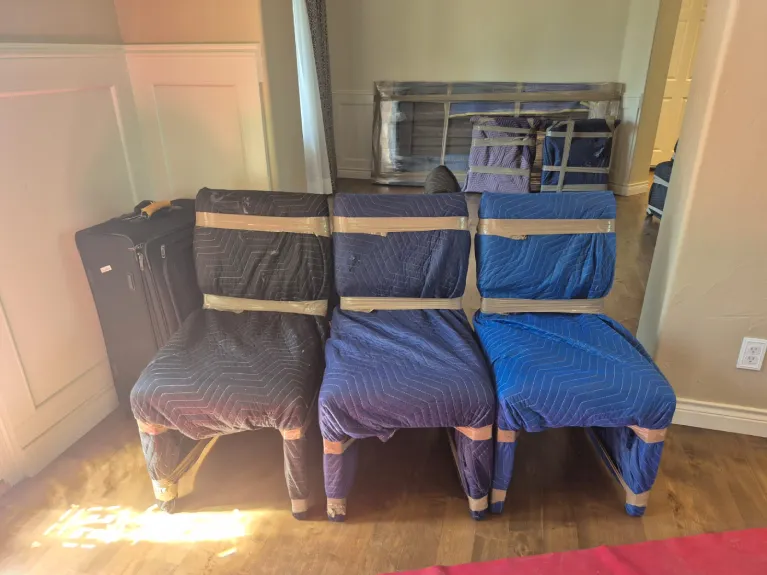Moving into a Denver high-rise goes far beyond the details of packing up your household.
There are numerous reasons to move to Denver, as it attracts residents from surrounding suburbs and beyond, while also retaining its local community.
It is a hot spot, but there are plenty of logistical considerations that one must make before the big day.
From a manageable timeline to securing building guidelines and parking spots, this article will review every detail!
What Denver High-Rise Buildings Typically Require
Specific building policies are being developed and will vary as the High-rise moves into Denver.
These regulations are created for the protection of the property and residents.
You will often see the following when moving in or out of a high-rise:
- Freight or passenger elevator reservations.
- Time slot restrictions for moving in or out of a building.
- Loading dock access requirements.
- Certificate of Insurance requirements.
- Protection and padding for the moving process.
- Notice required for building management.

Step 1 — Contact Building Management Early
Taking the first step begins with getting in touch with your building manager and following up with Denver local movers!
They should provide a brief overview of everything you will need to coordinate moving into or out of a space.
In contacting them with advanced notice, you give yourself a chance to plan in advance.
This is also sometimes required by property owners.
What to Ask in Your First Email or Call
When you first reach out to the property owner, asking the right questions is essential.
This can save you time and help to prevent any future hurdles or possible headaches.
The key things you will want to cover are as follows:\
- Elevator reservations, general availability, and required fees that may be incurred.
- Loading dock access, time slots, and specific rules.
- COI and coverage needed for moving companies.
- General protective equipment requirements.
- Move-in restrictions are in place for particular hours, days of the week, or notice periods.
- Parking permits are required if a temporary permit is needed to access the building.
Documents to Request
You may also want to cover any paperwork that is necessary for the move.
Be sure that you request all information for the following documents if applicable:
- General building moving policies for your review and understanding.
- COI sample and specific liability requirements.
- Reservation confirmation or elevator reservation forms.
- Fee schedules are related to deposits or service charges.
- Permit information and details on temporary parking permits when required for the building or loading zones on the property.

Step 2 — Reserve the Freight Elevator (Without Surprises)
To ensure the day runs smoothly, it is critical to reserve the freight elevator.
In high-rise buildings, the elevators can end up booked up quickly.
However, professional Denver office movers with residential experience are highly familiar with these kinds of requirements.
The earlier you coordinate things, the easier it will be for everyone!
Lead Times & Peak Days
The weekends are always going to be the busiest time to attempt an elevator reservation.
On top of that, everyone is always trying to complete a move-out at the end of the month, as this is generally before the lease ends.
Securing these slots with a couple of weeks to even a couple of months in advance can help to avoid surprises, possible double occupancy, or the inability to book.
Required Protection & Prep
High-rise apartments and condos in the Mile High will likely require additional forms of protection for a move.
This can include items such as elevator pads, floor runners, protective barriers, and corner guards.
Taking these kinds of precautions can help prevent damage to the property and your belongings!

Step 3 — Book the Loading Dock (And Curb Space if Needed)
There are many valuable tips for choosing movers, but one of the greatest is working with a crew that knows what they are doing.
High rises will want advanced notice of your loading dock needs to keep things organized and traffic running smoothly.
The right movers will know precisely how to work and help coordinate your move with the loading dock reservation!
Dock Dimensions & Truck Clearance
When booking your loading dock, ask about the specifics.
You will need to know general height clearance, any turning radius, or restrictions throughout the day.
All of this information should be passed on to the moving company so they can bring the right-sized truck.
Curbside or Alley Loading
When utilizing curb space, if the dock is full or booked, you will need to know where the truck can legally park and wait.
This will also queue you if a Denver city permit is required.

Step 4 — Handle Street Parking/Right-of-Way (ROW) Signage
Certain buildings in Denver will require temporary no-parking or right-of-way signage as part of a moving truck permit.
This process requires an application with the Denver DOTI online or in person.
You will then need to post signs and provide compliance photos before the move date.
This needs to be requested at least 5 to 7 business days before the permit is necessary.
To give yourself a buffer, request the permit a couple of weeks ahead of time.

Step 5 — Submit Your Certificate of Insurance (COI) Correctly
A certificate of insurance can feel complicated for renters in Denver.
It is actually a relatively straightforward process, so long as you do things the right way!
Coverage You’ll Usually Need
When your building requests a COI, they will have specific instructions and requirements.
The most common include the following:
- General liability. This basic coverage protects against property damage or injuries.
- Workers comp. This ensures the movers are covered in the case a member of the crew is injured on site.
- Auto liability. For the moving truck and its general operations on the property.
- Additional insured. This will be the building management or companies that need to be listed on the COI.
Common Wording Requests
Denver buildings can be specific on how things are worded for the additional insured parties and otherwise.
You may see set language about coverage limits, primary and non-contributory parties, etc.
Sample Email Template to Request COI from Your Mover
Here is an easy template to request a COI from your moving company:
Hello Movers,
I am scheduled for an upcoming move date of (date), at (address).
My building requires a COI with all of the following:
- Coverage limits: (List all requirements.)
- Additional insured: (Property owner, management company, HOA.)
- Specific wording: (Copy any wording directly from your building.)
Could you please send me this COI in advance to be submitted to (property management) and me?
Let me know if you need any additional information.
Thank you,
(Your Name)
(Your Phone Number)
You may also attach a sample COI for the movers.
Scheduling Strategy That Saves Time & Fees
The smarter and earlier you are with scheduling, the more time and money you can save.
Do your best to aim for a weekday to book elevators or docks.
This can also offer lower rates with the movers!
Try to avoid completing things at the end of the month and coordinate towards the middle, if possible.
Planning ahead of time will always create a smoother, more streamlined process.

Day-of-Move Checklist for High-Rises
When moving day arrives, having a checklist handy will keep things organized.
This creates a more comfortable environment for the day!
Arrival & Check-In
When the movers arrive, have your building management’s contact information handy.
Complete the check-in, sign in for security, secure the elevator key, and then allow the movers to begin setting up for the day ahead.
Staging & Protection
The crew will then begin by staging and setting up property protection equipment.
This is when the floor runners are going down, corner guards are set up, elevator pads are in place, and door jamb protectors are installed!
Exit Procedure
An exit procedure and walk-through will be performed to wrap things up.
This will usually include all protection equipment removal, review of the property for any potential damages, trash removal, and a formal check-out with building management.
Each property is different; some will require this for the deposit refund once the move is completed.
Following these procedures will ensure you are heading out on good terms with the property and avoid any unnecessary fees or fines.

Downtown & Neighborhood Notes (What Changes by Area)
These are some of the best neighborhoods for Denver high-rise moves, but they are all characterized by their own unique needs.
- LoDo. Here, there are bustling streets that remain packed throughout the day, so parking permits are a must!
- Union Station. Another high traffic region with both residential and commercial buildings, meaning coordination of loading docks and elevator reservations should be done early.
- Cap Hill. This is a historic district with much older buildings. Protection during move-ins and move-outs is pivotal, and you must have a highly experienced team of movers.
- Cherry Creek. There is relatively limited street parking in the area; advanced notice for permits and loading area reservations is key!
- RiNo. With loads of trendy loft-style apartments and more industrial spaces, careful coordination is needed with the property management companies to ensure a smooth move.
Fees, Deposits & Hidden Costs to Budget
Don’t forget to set aside any required fees for securing an elevator attendant, required security off-hours charges, permits, and more.
It is good to speak with your property manager about any fees that can come with a move-out so you know what to expect.

What a Professional Denver Moving Company Should Handle for You
With our local and long-distance movers Denver, we are doing more than just lifting and loading boxes.
Our team handles everything, from obtaining the necessary COIs quickly to reserving elevators or parking permits – leave the logistics to us!
We arrive with the right equipment, protection, and experienced crew to keep stress low and excitement high.
Common Moving Mistakes (and How to Avoid Them)
Relocating your entire household may feel like an overwhelming process.
With our moving tips blog and a complete understanding of the mistakes one can make, the entire process goes smoothly.
Keep your eye out for the following mistakes:
- Booking your movers late in the game can be a costly mistake. Instead of waiting, get a head start on things as early as possible.
- Ignoring or setting aside building rules for the move. You don’t want to be scrambling for a COI the day before the move.
- Underestimating the packing time. It may take longer than expected. Consider asking our movers about the full packing service option!
- Skipping adequate protection for the property. You don’t want to leave or walk into a new place and cause damage. That is why padding and protection are necessary.
People Also Ask
Whether you are planning on moving from Boulder to Denver or from one neighborhood in the city to another, it is natural to have questions.
Our team has composed a list of the most frequent asks to help ease your mind!
How far in advance should I reserve a freight elevator in Denver?
The earlier you can reserve a freight elevator, the better, as many residential and commercial properties will have them booked out.
It’s common practice to check in with the property management company a couple of weeks in advance to review availability.
Our movers will work with your schedule to ensure a smooth moving process!
What insurance is required for moving into a Denver high-rise?
The insurance required by every high-rise building will differ depending on the property management company.
Just about every one of them will require the movers to provide basic liability, others will want additional documentation of workers’ comp, and some will have set stipulations on limits.
Do I need a city permit to park a moving truck downtown?
Whether you are moving in or out of Denver, a permit is likely needed to park.
While this is not true in every instance, it is a common occurrence.
The city has developed regulations around street parking in certain areas, and permits will authorize you to park in a set space for a set duration of time.
What's the difference between a freight and passenger elevator for moves?
Freight elevators are larger and designed to carry bulky items or heavier loads.
These are ideal for moves.
However, passenger elevators work as well, even though they were created to carry people up and down throughout the building!
Who provides elevator pads and floor protection—me or the movers?
Our movers will always provide sufficient elevator padding and floor protection during the move.
It is our job to limit the risk of damage to property and your household goods.
Not all moving companies will provide these items, and it is wisest to ask about these matters before booking the move.

Get a Permit-Ready, COI-Ready Quote
Securing the correct permits and verifying insurance requirements doesn’t need to be a stress on your plate during a move.
At Eden’s Moving Services, our professionals will provide a free moving quote with all permits and COI details built into the process.
Our team provides a personalized experience, including a personal moving representative who supplies a virtual or in-person survey for accurate moving estimates, along with a building-compliant plan.
Contact us to get started on your journey today.
